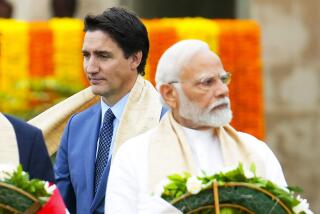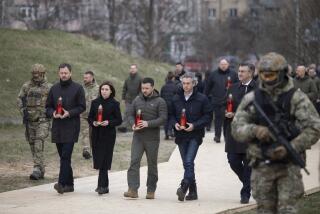Action Against 20 for Nazi Crimes Urged in Canada
- Share via
OTTAWA — A government commission Thursday called for the urgent prosecution or deportation of 20 suspected Nazi war criminals living in Canada, but it dismissed as “grossly exaggerated” charges that the country is a sanctuary for thousands of people who carried out World War II atrocities on behalf of Adolf Hitler.
The release of the report by the Commission of Inquiry on War Criminals followed a two-year, $2.6-million investigation touched off by Jewish groups’ allegations that Canada may have allowed as many as 6,000 Nazi collaborators and war criminals to enter after the fall of Hitler in 1945.
Because the government of Prime Minister Brian Mulroney had ordered the commission not to identify any suspects by name and to avoid national or ethnic characterization, none of the 20 was named publicly, although they are listed in a secret addendum.
The head of the commission, Judge Jules Deschenes, said he looked into 880 cases of alleged war criminals and dismissed most of them for various reasons, including deaths, departure from Canada or lack of proof that they had ever been in Canada.
The commission said it has not had time to examine 218 cases. However, Justice Ministry officials indicated that most, if not all, of these probably will be dismissed.
The accusations had torn open barely suppressed antagonism between Canada’s 350,000-member Jewish community and the nearly 1 million Ukrainians living here, since most of the allegations dealt with Ukrainians.
Intermittent Charges
The question of Canadian treatment of alleged war criminals has ebbed and flowed since the end of World War II, with charges erupting intermittently that the government failed to take the matter seriously.
Canada has never tried a war criminal and has extradited only one suspect--a former Nazi sergeant, Helmut Rauca, who was sent to West Germany in 1982 after living undetected in Toronto for 30 years. Rauca died before he could be tried on charges of complicity in the murders of 11,584 Lithuanian Jews.
The commission acknowledged that Canada had essentially dropped the pursuit of war criminals after the war, largely because of British warnings that further inquiries would weaken the Western alliance in the Cold War by antagonizing the new West German government.
Furthermore, Deschenes wrote, Canada’s behavior was no worse than that of most other nations, a contention that was met with skepticism on the part of some Jewish leaders.
‘Shame on Us’
“First of all, it just isn’t true that other countries were as bad,” said Sol Littman, Canadian representative of the Simon Wiesenthal Center. “And if it were, then shame on us.”
The findings of the commission were greeted with relief by the government and Ukrainian groups. The reaction by Jewish organizations, on the other hand, ranged from guarded endorsement to resignation.
Littman said in an interview that while there are “some positive elements” in the report, it “did not go far enough.”
Littman, who was responsible for much of the agitation that led to the formation of the commission, said a major flaw was the government’s failure to establish an Office of Special Investigation similar to the agency created by the U.S. Justice Department to pursue war criminals.
David Matas, senior counsel of the Canadian B’nai B’rith, told a news conference that he was “pleased overall with what happened” because “it looks like something finally will be done” to bring war criminals in Canada to justice and to heal the rift between various ethnic communities.
Trial Recommendation
He and other Jewish spokesmen said they were pleased with the recommendation that suspected war criminals be tried in Canada with the use of evidence obtained from the Soviet Union and other Eastern European nations, a procedure bitterly opposed by several ethnic communities that denounce such material as tainted.
However, Matas expressed some serious reservations. Like Littman, he cited the lack of a special investigating agency, and he also criticized the refusal of the Mulroney government to agree to some commission recommendations for changing the laws to make it easier to deport or extradite suspects.
He said his group’s final judgment will depend on how fast the government implements the findings that it did accept.
Justice Minister Ray Hnatyshyn generally praised the report--although he had ordered it rewritten last December because it was too explicit in identifying suspects--as representing “a substantial clearing of the air with respect to war criminals.”
‘Action Is Required’
“We are no longer confronted with an undefined problem with no solution in sight,” Hnatyshyn said. “Rather, it is now apparent that the problem of war criminals is not as extensive as had been feared.”
Still, he told the House of Commons, “it is apparent that action is required and that a resolution of this problem can be found within our system of justice.”
He said the government accepted some findings on changing the criminal code to broaden the definition of war criminals and to liberalize some elements of citizenship, extradition and deportation issues.
But he said all prosecutions would “be made in Canada,” conforming to Canadian legal and constitutional requirements.
Besides refusing to set up a special investigative agency, Hnatyshyn also rejected Deschenes’ call for easing protection for those suspects already holding Canadian citizenship and a recommendation that new extradition agreements be signed with some countries, including Israel, to allow those charged to be tried abroad.
No Extradition Change
“No change in current law or practice with respect to extradition will be made to specifically address the situation of war criminals,” he told Parliament.
Littman was especially critical of this stand, pointing to a case where Canada has refused a Netherlands government request to extradite a man already convicted of treason because that crime is not included in Canada’s extradition treaty with that country.
Although the justice minister pledged extra money and manpower to continue the pursuit of war criminals and to follow the recommendation for immediate action against the 20 specific suspects, he declined to say when he would act on proposing the necessary legal changes in the criminal code.
Deschenes was critical of Littman and other Jewish spokesmen over their charges that thousands of possible war criminals and collaborators live in Canada and that Dr. Josef Mengele, a Nazi physician responsible for atrocities at the Auschwitz death camp, may once have entered Canada.
Commission’s Creation
Even though it was this contention that sparked the creation of the commission that the justice minister now praises, Deschenes’ report said that “this is a case where not a shred of evidence has been tendered to support” the charge that Mengele entered or even sought to enter Canada.
The report also rejected charges that Canada permitted entry to as many as 2,000 members of a Ukrainian military unit called the Galicia Division that collaborated with the Nazis.
More to Read
Sign up for Essential California
The most important California stories and recommendations in your inbox every morning.
You may occasionally receive promotional content from the Los Angeles Times.













